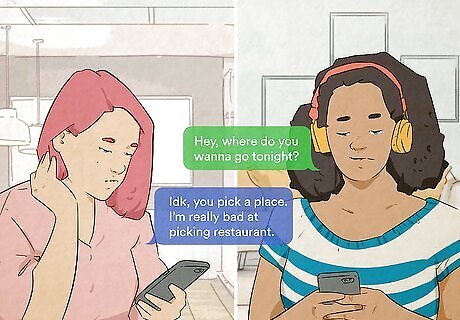
views
- Weaponized incompetence is a pattern of behavior where a person pretends to be bad at a mundane task to avoid doing it.
- Weaponized incompetence mainly happens in romantic relationships. It can also happen in friendships, co-parenting relationships, and in the workplace.
- Red flags to watch out for include “forgetting” to do tasks and someone telling you you’re better at a boring or mundane task.
- Communicate about the patterns you’ve noticed, and set clear boundaries to avoid being taken advantage of.
What is weaponized incompetence?

Weaponized incompetence is when a person pretends to be bad at a mundane task to avoid having to do it. In reality, the person can do the task themselves—they just don’t want to. It can be intentional or unintentional, but it puts the burden of shared tasks onto the other partner instead of them both being equally responsible. For instance, maybe you often cook meals for your family because your partner is “bad” at cooking. In reality, they could learn how to cook or make simple meals—they just don’t feel like it. Over time, weaponized incompetence can cause a lot of tension and stress within the relationship. Since one partner is taking on more of the mental load, they often feel taken advantage of.
Where does weaponized incompetence happen?

Romantic relationships Weaponized incompetence is most often seen in heterosexual romantic relationships. Typically, one partner will use weaponized incompetence to get out of doing their share of the workload. This could be doing chores, planning dates, or booking vacations.

Parenting Weaponized incompetence also happens during co-parenting. One partner might use weaponized incompetence to avoid doing household tasks or to get out of managing the household. Usually, they will label themselves as the “fun” parent.

Friendships Have you ever had a friend that won’t make the plans, but always shows up to them? In some friendships, weaponized incompetence is used to get out of setting up events or making plans with others.

The workplace You might have a coworker who is using weaponized incompetence to get out of doing boring or mundane tasks. Typically, they will use their incompetence to avoid doing things like data entry or paperwork.
Signs of Weaponized Incompetence

Telling you they don’t know how to do a simple task When you become an adult, there is a baseline skill set that you have, even though no one really taught you. When someone says they “don’t know how” to do something mundane, like washing the dishes or doing a load of laundry, it’s likely that they’re exaggerating their incompetence to get out of doing something. “But I don’t know how to mow the lawn.” “Can you call the kid’s doctor? I don’t know how to schedule an appointment.” “I can’t remember how to convert this to a PDF.”

Doing a task badly Someone using weaponized incompetence might mess things up on purpose so you never ask them to do that task again. It might be believable the first time, but after the second or third time it happens, you’ll start to notice a pattern there. “I cleaned the bathroom, but I think I used the wrong cleaner. Now the floor is all sticky.” “I tried to do a load of laundry, but I shrunk your favorite sweater. I’m sorry.”

Telling you you’re better at the task When someone compliments how well you do something mundane, it’s likely that they’re trying to get you to take over (how exactly are you “so much better” at sweeping the floor?). This is especially prevalent in romantic relationships, which can be frustrating. “I know you asked me to repot the plants, but you’re so much better at it. Could you take over?” “I started to wash the windows, but they don’t look as good as when you do it. You’re so much better at this than I am.”

Constantly “forgetting” to do tasks When you ask an adult to do something and they agree, there’s no good excuse for them to just up and forget. When someone “forgets” to do a task over and over, it forces you to be on top of them the entire time. Chances are, they didn’t actually forget, and they’re hoping that you swoop in and do the task yourself. “Oh man, I totally forgot to do the dishes. I already have plans tonight; can you do them?” “I completely forgot that you asked me to vacuum. I’ll get to it, I swear.”

You feel taken advantage of If you feel like you’re taking on more responsibility around the house or in the workplace, you probably are. There’s a good chance that this person’s behavior is weighing on you, and you’re noticing just how much more you do on a daily basis. Try taking a mental inventory of all the chores you do during the day. Now, do the same for your partner. If things aren’t relatively equal, it’s time to talk about it.

You feel alone in the relationship Dealing with weaponized incompetence can be very isolating, and for some people, it makes them feel like they’re the only person putting effort into the relationship. You might feel like instead of a partner, you have an additional child to take care of. Your partner should be there to help and uplift you, not to add to your burden.
How to Deal with Weaponized Incompetence

Communicate about the patterns you’ve noticed. If you’ve noticed that someone in your life is displaying signs of weaponized incompetence, sit them down and talk about it. Explain your concerns and how it’s causing resentment within the relationship. Hopefully, they’ll be open and willing to change to better your relationship. “Could we talk for a minute? I’ve noticed that you tend to ‘forget’ when I ask you to do things. I’m starting to feel a little resentful, especially because I’ve been doing most of the chores lately.” “Hey Aaron, can we chat? I just feel like I’ve taught you how to enter in your hours multiple times now, and you should be able to do this on your own. If you’re still struggling, maybe you could talk to the boss instead.”

Split up household chores. If the person displaying weaponized incompetence is your live-in partner, making a chore chart might be able to squash some of the resentment. It’s common for one partner to take on more of the household chores, but it isn’t exactly fair. Sit down with your partner and assign tasks to each other, then make a promise to stick to them. “We could try making a chart of everything that needs to get done, then checking them off one by one. Which chores would you prefer to do during the week?” “This is everything that I’ve been taking on during the day. It would be great if we could split up that list and make things feel a bit more even.” Explain how the help would be beneficial to you, make your life easier and maybe even help the relationship.

Leave them on their own to figure things out. An adult can be left to their own devices to handle basic tasks. If someone says, “But I don’t know how to do this,” simply walk away and leave them be. Chances are, they will work on finding a way to complete the task. Say something like, “I’m sure you’ll figure it out,” or, “Try looking it up,” as a way to signal that you won’t be helping them.

Set boundaries and stick to them. Let the other person know that you won’t be taking over their tasks anymore. They may try to push you on this, so stick to your boundaries. Remember, “no” is a complete sentence, and you can walk away if you need to. “From now on, I need you to do your half of the chores. If you don’t do them, they just won’t get done—I’m not going to take over for you.” “I don’t have time to walk you through any more of your tasks. If you need help, you can ask someone else.” “I need you to pull your weight around the house. If things don’t change, I’m going to have to re-evaluate this relationship.”




















Comments
0 comment